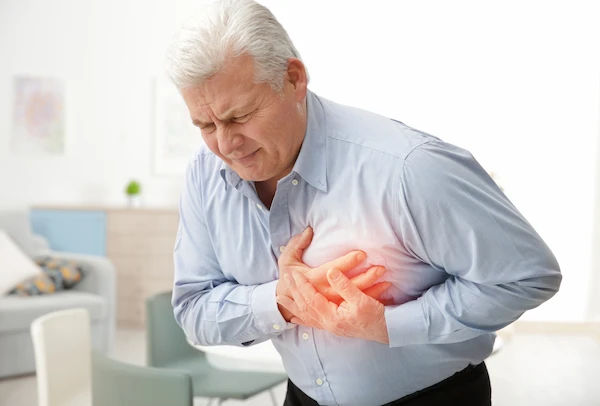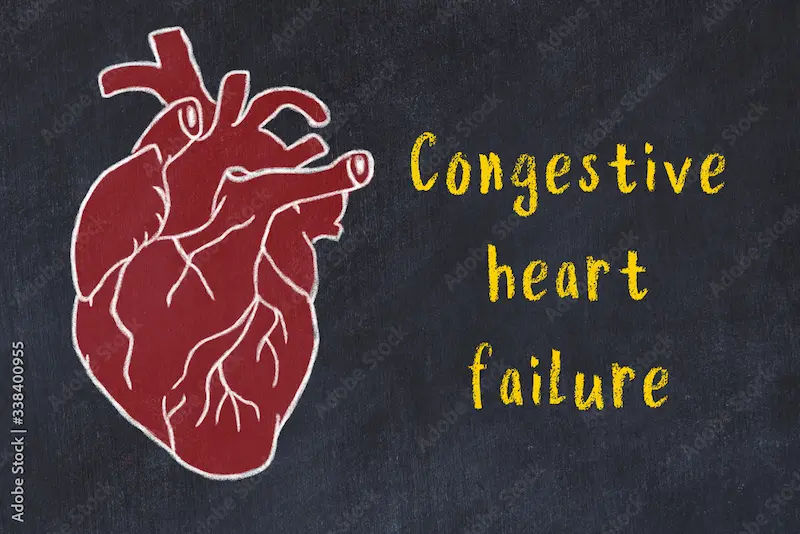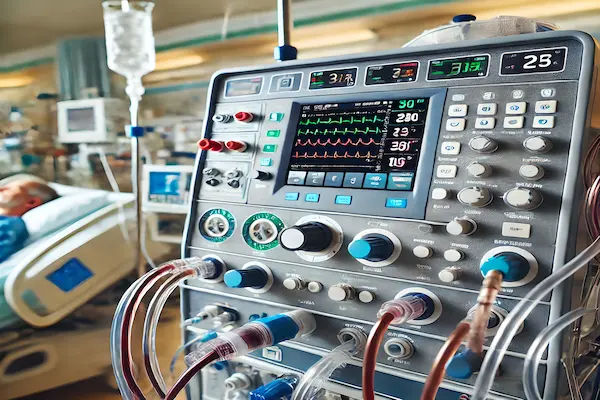Congestive Heart Failure: Symptoms, Causes, and Treatments
Understand congestive heart failure, including its symptoms, causes, and treatment options, to help manage heart health and improve quality of life.


Introduction
The term "heart failure" sounds frightening, often misunderstood as the heart stopping completely. In reality, congestive heart failure (CHF) describes a serious condition where the heart muscle becomes weakened or stiff, compromising its ability to pump blood efficiently throughout the body. The key word is "congestive." When the heart's pumping power diminishes, blood can back up or become congested in other parts of the body. This leads to fluid leaking into the lungs, liver, abdomen, and legs, causing the hallmark symptoms of shortness of breath and swelling. Understanding the symptoms and treatment of congestive heart failure is the first step toward effective management. This article will demystify CHF, exploring what leads to this cardiology concern, how to recognise its signs, and the modern treatment strategies that can help you or a loved one live a longer, more active life. We'll move beyond the basics to provide a clear, comprehensive guide for anyone seeking to understand this condition.
What Exactly is Congestive Heart Failure?
When the heart struggles to pump effectively, it can impact overall health.
It's About Pumping Efficiency, Not a Stopped Heart
Think of your heart as a powerful pump. Congestive heart failure means this pump isn't working as well as it should. It hasn't stopped; it's just struggling to meet the body's demands for oxygen-rich blood. This inefficiency triggers a cascade of problems, primarily fluid retention, which is the source of the "congestion."
Left-Sided vs. Right-Sided Heart Failure: A Crucial Distinction
The heart has two sides, and failure can occur on one or both.
Left-Sided Heart Failure (Most Common): The left ventricle is the heart's main pumping chamber. When it fails, it can't effectively pump blood out to the body. Blood backs up into the lungs, causing pulmonary oedema, which leads to shortness of breath.
Right-Sided Heart Failure: This often occurs as a result of left-sided failure. The backed-up pressure from the lungs puts strain on the right ventricle, which is responsible for pumping blood to the lungs. When it fails, blood backs up into the veins, causing swelling (oedema) in the legs, ankles, and abdomen.
Consult a Cardiologist for the best advice
The Underlying Causes: What Leads to a Weakened Heart?
CHF is typically the end result of other conditions that have damaged or overworked the heart.
Coronary Artery Disease and Heart Attack: The Most Common Culprits
When arteries supplying blood to the heart muscle become narrowed by plaque, it reduces blood flow. A heart attack occurs when a plaque ruptures, completely blocking an artery and killing a portion of the heart muscle. This scarred muscle cannot pump effectively, leading to heart failure.
High Blood Pressure (Hypertension): The Silent Strain
Uncontrolled high blood pressure forces the heart to work much harder to pump blood against the high pressure in the arteries. Over time, this extra workload causes the heart muscle to thicken and become stiff, eventually leading to failure.
Cardiomyopathy: Direct Damage to the Heart Muscle
This refers to diseases of the heart muscle itself. Causes can include viral infections, alcohol abuse, and unknown factors (idiopathic).
Dilated Cardiomyopathy: The heart muscle becomes stretched and thin, leading to an enlarged, weak heart.
Hypertrophic Cardiomyopathy: The heart muscle becomes abnormally thick, making it hard for the heart to relax and fill with blood.
Other Significant Risk Factors
Heart Valve Problems: Leaky or narrowed valves force the heart to work harder.
Diabetes: High blood sugar damages blood vessels and nerves that control the heart.
Arrhythmias: Irregular heartbeats, like atrial fibrillation, can reduce the heart's efficiency.
Congenital Heart Defects: Structural problems present at birth.
Sleep Apnoea: Interrupted breathing during sleep stresses the heart.
Recognising the Signs: Symptoms of Congestive Heart Failure
Symptoms can be subtle at first and are often mistaken for normal signs of ageing.
Early Warning Signs You Shouldn't Ignore
Shortness of breath (dyspnoea): Especially during physical activity or when lying flat.
Persistent coughing or wheezing: Often with white or pink blood-tinged phlegm.
Fatigue and weakness: Feeling unusually tired from everyday activities.
Swelling (oedema): In the feet, ankles, legs, or abdomen.
Rapid weight gain: From fluid retention, a gain of 2-3 pounds in a day or 5 pounds in a week is a red flag.
Symptoms of Worsening Heart Failure
Confusion or impaired thinking.
A racing heartbeat.
Severe shortness of breath that disrupts sleep (paroxysmal nocturnal dyspnoea).
A swollen, tender abdomen and loss of appetite.
How is Congestive Heart Failure Diagnosed?
If you experience any early signs of heart failure, a proper diagnosis is crucial. If symptoms persist beyond two weeks, consult a doctor online with Apollo24|7 for further evaluation.
The Physical Exam and Medical History
A doctor will listen to your heart and lungs for abnormal sounds (like a crackle from fluid), check for swelling in your legs, and discuss your symptoms and risk factors.
Key Diagnostic Tests in Cardiology
Blood Tests: A BNP (B-type natriuretic peptide) test measures a hormone that rises with heart failure.
Echocardiogram (Echo): This ultrasound of the heart is the most important test. It provides an ejection fraction measurement, the percentage of blood pumped out with each beat, which helps classify the type of heart failure.
Electrocardiogram (EKG/ECG): Records the heart's electrical activity to check for arrhythmias or past heart attacks.
Chest X-ray: Shows if the heart is enlarged or if there is fluid in the lungs.
The Four Stages of Heart Failure: From Risk to Failure
The American College of Cardiology/American Heart Association defines four stages of congestive heart failure:
Stage A (At Risk): High risk but no structural heart disease or symptoms (e.g., patient with hypertension or diabetes).
Stage B (Pre-Heart Failure): Structural heart disease (e.g., reduced ejection fraction) but no symptoms.
Stage C (Symptomatic Heart Failure): Structural heart disease with current or past symptoms.
Stage D (Advanced Heart Failure): Marked symptoms at rest despite maximal medical therapy.
This staging system emphasises that treatment should begin early, even before symptoms appear, to prevent progression.
Treatment Strategies for Congestive Heart Failure
Treatment aims to relieve symptoms, slow disease progression, and improve survival.
Medications: The Cornerstone of Management
ACE Inhibitors/ARBs/ARNIs: Relax blood vessels, lower blood pressure, and reduce strain on the heart.
Beta-Blockers: Slow the heart rate and lower blood pressure, improving heart function over time.
Diuretics ("Water Pills"): Help the kidneys remove excess fluid from the body, reducing swelling and shortness of breath. These are key to managing fluid retention from CHF.
SGLT2 Inhibitors: A newer class of diabetes drugs now proven to be highly effective in heart failure.
Medical Procedures and Devices for Advanced CHF
Pacemakers/ICDs: Devices that regulate heart rhythm and prevent sudden cardiac arrest.
Cardiac Resynchronisation Therapy (CRT): A special pacemaker that helps the heart's chambers beat in sync.
Surgery: Coronary bypass, valve repair/replacement, or in extreme cases, a heart transplant.
The Critical Role of Lifestyle Modifications
A best diet for congestive heart failure is low in sodium (salt) to prevent fluid buildup. Other vital changes include fluid restriction, regular physical activity as tolerated, weight monitoring, and quitting smoking.
Living with CHF: Prognosis and Quality of Life
While CHF is a chronic condition, it is highly manageable. Many people live full lives for many years with proper treatment. Adherence to medication and lifestyle changes is the most significant factor in determining life expectancy with CHF. Apollo24|7 offers a convenient home collection for tests like BNP to help you monitor your condition easily.
Conclusion: Taking Charge of Your Heart Health
Receiving a diagnosis of congestive heart failure can be daunting, but it is not a hopeless situation. Modern cardiology has made incredible strides in understanding the symptoms and treatment of congestive heart failure. The journey involves partnership between you and your healthcare team. By understanding the causes, vigilantly monitoring for symptoms, and committing to a comprehensive treatment plan, you can actively manage the condition. Remember, knowledge is power. Taking proactive steps today can significantly improve your heart health and quality of life for years to come.
Consult a Cardiologist for the best advice
Consult a Cardiologist for the best advice

Dr. Pathuri Avinash
Cardiologist
6 Years • "DM- CARDIOLOGY IPGMER & SSKM, KOLKATA September 2017- September 2020 MD- INTERNAL MEDICINE MANIPAL ACADEMY OF HIGHER EDUCATION KASTURBA MEDICAL COLLEGE, MANIPAL May 2013 - May 2016 MBBS RANGARAYA MEDICAL COLLEGE,KAKINADA March 2006- March 2011"
Hyderabad
Apollo Hospitals Financial District, Hyderabad

Dr. Arulnidhi Ayyanathan
Cardiologist
12 Years • MBBS, MRCP, AB, MBA
Chennai
Apollo Hospitals Greams Road, Chennai

Dr Chandra Kumar Das
Cardiologist
10 Years • MBBS, MD, DM (Cardiology), NEIGRIMS, SHILLONG
Guwahati
Apollo Hospitals G S Road, Guwahati
(25+ Patients)

Dr. Ankur Agarwal
Cardiologist
18 Years • MD (Medicine), DM (Cardiology)
Lucknow
Apollomedics Super Speciality Hospital, Lucknow

Dr. Praveen Subbanna
Cardiologist
10 Years • MBBS, M.D. (JIPMER. PONDICHERRY), DM (cardiology, SMS MEDICAL COLLEGE, JAIPUR)
Bengaluru
Apollo Hospitals Bannerghatta Road, Bengaluru



